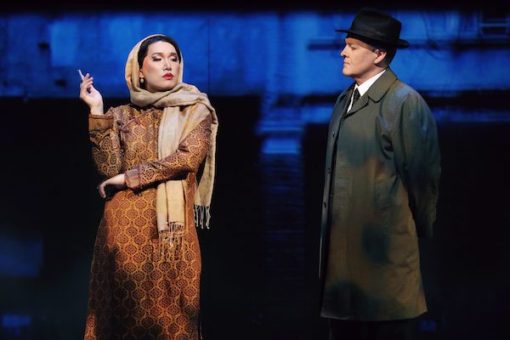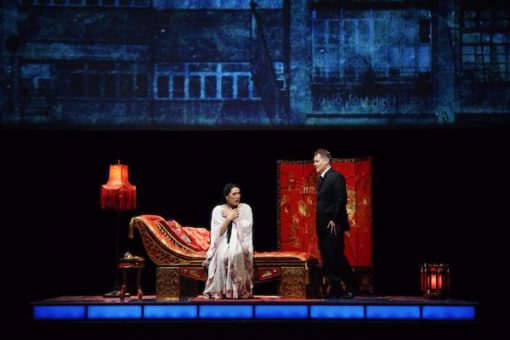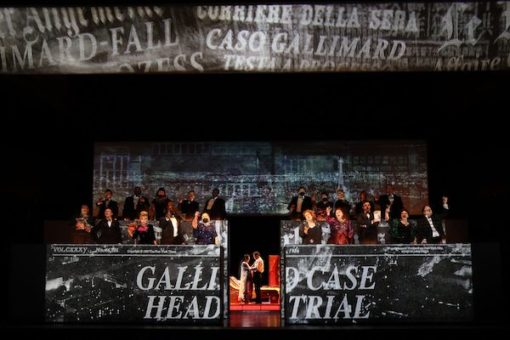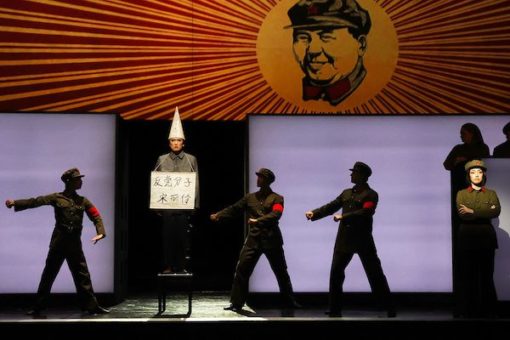Santa Fe Opera returns with courageous yet musically flawed premiere of “M. Butterfly”

The Santa Fe Opera is back.
After 2020, the first summer in its history without live opera, the company presented a shortened season of only thirty performances last year. This summer the company returns to its full five-opera slate, although without works by its founder’s favorites, Mozart and Strauss. Yet the mountaintop venue is looking once again like the nation’s premiere summer opera destination, beginning with the world premiere of a new opera, M. Butterfly, on Saturday night.
Coronavirus postponed this event from the 2020 canceled season, but composer Huang Ruo finally makes his belated return to Santa Fe with this new work. The Chinese-American composer had his Santa Fe Opera debut in 2014 with the leaden Dr. Sun Yat-sen. For this opera he turned again to David Henry Hwang, the librettist of his second opera, An American Soldier, premiered at Washington National Opera.
Hwang revised the text of M. Butterfly, his Tony-winning play from 1988, for Ruo to set to music. The story, based on the life of an actual French diplomat in China, follows the affair between René Gallimard, a civil servant at the embassy in Beijing, and Song Liling, a Peking Opera singer of female roles who happens to be a man. Song also turned out to be a spy for the Chinese government, causing a furore when their real-life counterparts were put on trial in 1986.
At the trial, Gallimard reveals that he never knew Song was a man, having never seen him unclothed, in spite of their intimate relationship. Song even pretended to be pregnant with Gallimard’s child, producing an infant allegedly supplied by the Chinese government and moving to France to be with Gallimard. Hwang states that he sees Song as a gay man who portrays women and Gallimard as a gay man who cannot accept his homosexuality.

If you thought Tosca was a “shabby little shocker,” as the late Joseph Kerman put it, this opera blasts far past it on its way over the top. Baritone Mark Stone crooned and howled with startling power as Gallimard, a punishing role featured in almost every scene in the opera. Even the level of sympathy he created by his sincere stage presence throughout the evening could not sustain the rather absurd ending. The character, putting on a kimono, makeup, and wig, recreated the death of Puccini’s Madama Butterfly by slitting his throat with a ceremonial sword.
Korean-American countertenor Kangmin Justin Kim made an astounding Santa Fe debut as Song Liling. From his entrance, giving a passable rendition of Puccini’s “Un bel dì, vedremo,” Kim was utterly believable in his female persona. Kim’s vocal tone was sweet and feminine, and his acting courageous, concluding with a moment of full-frontal nudity when he revealed himself to Gallimard toward the end of Act III.
The supporting cast was excellent, with Chinese mezzo-soprano Hongni Wu in a company debut, as the sadistic Communist party cadre who enlists Song as an agent. Bass Kevin Burdette provided much-needed comic relief as the stuffed-shirt French ambassador, who exaggerated his pompously emphatic glissandi and final consonants. Tenor Joshua Dennis added more heavy-handed European colonial snideness as Gallimard’s swaggering former schoolmate Marc.
Unfortunately, Ruo’s score did not have enough variety of harmony and orchestration to sustain this level of melodrama. At two-and-a-quarter hours—which felt much longer—there was a disappointingly low number of textures encountered over and over. A hammered orchestral unison, building into a cluster of complicated syncopation, denoted agitation in multiple situations. These included the introduction of the sneering society chorus (forceful in relatively small numbers and adroitly prepared by Susanne Sheston) not once, but twice.

Ruminative scenes, like that between Song and Gallimard in Act I, were always accompanied by slow, meditative chords, built up into often dissonant structures. An overused mark tree always signaled mysterious transitions, generally when Song appeared on stage. Pizzicato strings, like raindrops, and dry, rattled percussion approximated the sounds of Chinese folk music. Conductor Carolyn Kuan used large, frantic gestures to keep the stage and pit on the same page in faster sections.
The highlight was Ruo’s ingenious embroidering over passages quoted from Madama Butterfly, including a cynical allusion to The Star-Spangled Banner. Ruo’s most effective original passages, atmospheric scenes sung by the chorus offstage, even brought to mind Puccini’s Humming Chorus. At one point, this vocal music was the only accompaniment to singers on stage, creating a mysterious effect as the orchestra fell silent.
James Robinson directed a much more diverting production than his staging of Ruo’s Dr. Sun Yat-sen. Platforms of varying heights rolled on and off stage to create scenery for Song’s bedroom, the courthouse, and jingoistic expatriate gossip (scenic design by Allen Moyer). Lighting director Christopher Akerlind and projection designer Greg Emetaz illuminated these mobile set pieces and the rear wall with evocative color and images. Seán Curran mimicked Chinese choreography in dynamic scenes given to three uncredited dancers.
Ruo and Hwang have spoken about a scene added to the libretto for this new version. After hearing Song Liling perform Puccini, Gallimard goes to the Peking Opera, a particular musical style known as jingxi or jingju in China. He watches Song perform a scene from a work called Butterfly Lovers, which also touches on the subject of gender confusion. Ruo wrote this scene in a style reminiscent of Peking Opera, in unison or heterophony accompanied by bending strings and cymbals.
It is an authentic touch in an opera that aims to make East meet West yet with characters that tragically find it impossible to reconcile their different worlds.
M. Butterfly runs through August 24. santafeopera.org
